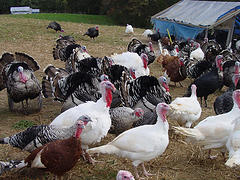What does the apparent collapse of the supercommittee charged with cutting the US deficit have to do with what appears on your plate this Thanksgiving? People are still sorting through the rubble, but it appears that one side effect may be a fuller debate over the next version of the farm bill.
And what does this mean for the Northwest? To start, the US farm bill controls far more than what happens on farms. It establishes the food safety net for low-income people, conservation programs that benefit soil and wildlife and water, the chances that a young farmer might get a loan to buy a tractor, high-speed Internet access in rural areas, and what might wind up on your child’s lunch tray.
It also includes agricultural subsidies that support commodity crops and which currently flow primarily to Midwestern and prairie states. According to the Environmental Working Group’s online database of farm subsidies, only 18 percent of Washington farmers and 11 percent of Oregon farmers received subsidies in 2007. Compare that to 81 percent of the farmers in Iowa, 74 percent of those in Minnesota or 68 percent in Kansas. And these incentives make twinkies cheaper to produce than carrots, as this video by food guru Michael Pollan explains:
Until the supercommittee process imploded, legislators from four Midwestern states were making decisions behind closed doors about what should be in the next version of the farm bill, which is rewritten every five years, and hoping to insert it in the package of cuts that the deficit-cutting committee recommended. This could have circumvented virtually all public debate about what should be in the bill, as this radio story from KQED in California details:
Now that the deficit cutting committee appears to have reached a dead end, it looks likely that the 2012 Farm Bill will follow a more normal—and public—process. It’s a victory for transparency, for sure, though some advocates for change point out that it’s unclear whether they’ll fare better going through the full Congressional process.
As for what we might wish for, Seattle residents and politicians (who have no control over the federal farm bill but argue that it influences everything from local childhood obesity rates to health insurance costs for local businesses) have come up with the Seattle Farm Bill Principles, or a list of priorities that they would like to see drive improvements in the next farm bill. If those seem a little abstract, they also offer more detailed ideas about what the principles might look like in practice, from giving farmers incentives to grow the most nutritious foods to strengthening farmland protection to ensuring safe working conditions for food workers.
Bonus for anyone who has read this far: To get the best bang for your buck for your Thanksgiving meal, check out the handy charts Sightline made earlier this year showing which fruits and vegetables offer the most nutrition for your money. Braised cabbage and apples, anyone?

